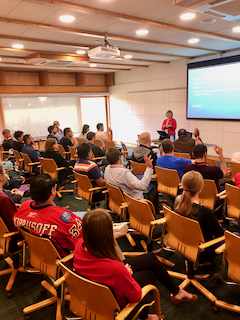Power BI Performance Tuning with Eugene Meidinger
Eugene Meidinger stops by the Dear SQL DBA Podcast to chat about Power BI Performance Tuning.
We talk about the various engines and languages used in …
Read MoreToday I was looped in on an email thread about the pros and cons of attending a specific event. One person on the thread asked if any of us had attended the event in the past, and whether or not event attendees were engaged with presenters and vendor representatives.
My immediate thought was: of course the attendees were engaged, because the event is a SQL Saturday. I’ve never been to a SQL Saturday where the attendees weren’t engaged.
But, I realized that it’s a fair question.

I’ve been to other tech events: from free events to very expensive ones, where attendees didn’t interact much with anyone else. Mostly people worked away on their laptops/phones/tablets quietly (maybe taking notes, maybe playing Minecraft, hard to say). The speakers seemed a little inaccessible and like they were very busy apart from when they were speaking, and they’d generally disappear right after their talk.
There are definitely a lot of people who attend SQL Saturday events who aren’t yet part of the broader SQL Server / Microsoft Data Platform community. They’re at a crossroads in their career and they’re not completely sure if this technology is for them yet, and they’re checking out this free event to see what they might learn from it. But I think the unusual thing about SQL Saturdays is that these events tend to draw these new folks into conversation with people who are already part of the community.
It’s traditional for speakers at SQL Saturdays to encourage questions and comments, and usually at SQL Saturdays there is no lack of attendee questions.
At some tech events, nobody ever “breaks the ice” during sessions by asking a question that’s accessible to beginners, and it can be tough to get the audience to ask questions or make comments. (Aside: if you are a speaker and would like me to ask a dumb question* from the audience to break the ice in your session, I am happy to do so! I am proud to provide this free service anytime I am around.) I’ve never found “too much quiet” to be a problem with SQL Saturdays, even at the events in countries where people are traditionally more reserved. I attended a lunchtime session at a SQL Saturday in Cambridge where Grant Fritchey got a room full of British people to share their experiences and pain points throughout the whole hour.
SQL Saturday organizers are also very good at packing their schedules with a variety of sessions that are quite accessible for people at different phases of their career and different experience levels, which helps everyone find content they can relate to.
There’s a certain community vibe at the event that I think newcomers often feel and want to be part of. You see people who are chatting about what they’re up to, their experiences, and what they want to learn, and it’s natural to want to be a part of that.
I tend to take this community vibe, and in fact the supportiveness of the whole SQL Server community for granted, most of the time. But it’s a real thing, and it’s great to be a part of.
If you haven’t been to a SQL Saturday and you’re reading this, check out SQLSaturday.com and look for SQL Saturday events in your area or your region. Even if you’re not committed to working in the Microsoft data platform. Even if you’re just a little bit curious about learning something for free on a Saturday. It’s a wonderful event, and it makes it easy for you to meet new people, to check out all sorts of new things, and to get engaged with the community of people involved in the Microsoft Data Platform.
I hope to see you at an event soon.
Copyright (c) 2025, Catalyze SQL, LLC; all rights reserved. Opinions expressed on this site are solely those of Kendra Little of Catalyze SQL, LLC. Content policy: Short excerpts of blog posts (3 sentences) may be republished, but longer excerpts and artwork cannot be shared without explicit permission.